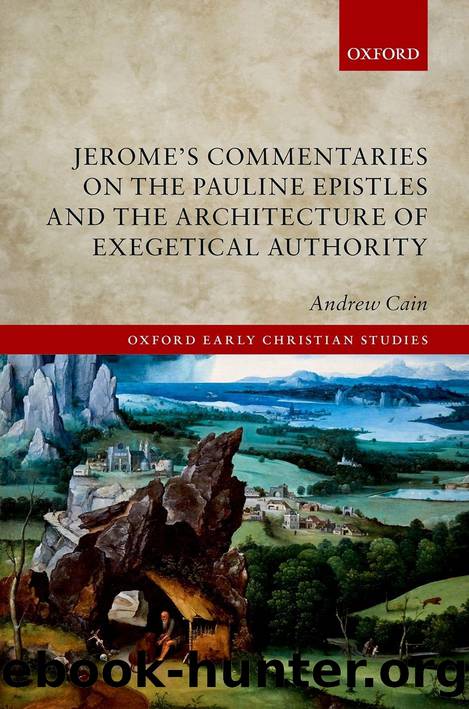Jerome's Commentaries on the Pauline Epistles and the Architecture of Exegetical Authority by Andrew Cain;

Author:Andrew Cain; [Cain, Andrew]
Language: eng
Format: epub
ISBN: 9780192662910
Publisher: OUP Premium
Published: 2021-09-07T00:00:00+00:00
5
Orthodoxy and Heresy
Tertullian famously called Paul âthe hereticsâ apostleâ (haereticorum apostolus).1 This epithet was meant not as a slight to Paul but as a cynical acknowledgment that some teachersâTertullian was thinking most immediately of Marcion2âclaim him as their own and cite his authority to justify their own belief systems. In antiquity many religious groups, from the Marcionites and Manichaeans to the various Gnostic sects (e.g., Valentinians and Basilidians), did indeed regard themselves as legitimate Christians in the Pauline tradition.3 Still other Christians, whose âorthodoxâ beliefs would end up more or less winning the day by the mid-fourth century, made their own unique claims to absolute truth and tried to sideline their theological opponents, branding their teachings as âheresies,â4 or aberrations from the pristine faith they believed had been vouchsafed to them by Jesus and the apostles in an unbroken line of succession.5
In their effort to marginalize their doctrinal opponents, orthodox intellectuals harnessed the power of the written word. One of the most effective weapons in their arsenal was the religious blacklist known as the heresy catalogue.6 Another, less sensationalistic one was the biblical commentary. To take one early example, Origen composed his compendious commentary on John to provide an interpretation of the fourth Gospel that would appeal to Christian intellectuals in general,7 but his more specific aim evidently was to offer a rebuttal of the Johannine commentary that the Valentinian exegete Heracleon had authored between c.160 and c.180.8
To Origenâs mind, heresy arises when Scripture is erroneously interpreted, and so the only logical remedy to heresy is the orthodox, or right-thinking, interpretation of Scripture.9 Jerome shared this outlook and viewed the stamping out of heresy as one of the biblical exegeteâs principal goals.10 In fact, none of the other five late antique Pauline commentators in Latin devotes nearly as much space to this as he does.11 In this chapter we explore the pervasive anti-heretical rhetoric in his opus Paulinum, beginning with the literary techniques he uses to demonize theological opponents as the unholy âotherâ and, conversely, to heroicize himself as a pious vir orthodoxus. We then examine in turn three prominent anti-heretical thematic strands in his commentaries and interrogate how he deploys the doctrines under criticism as foils for solidifying his own hermeneutical priorities.
Download
This site does not store any files on its server. We only index and link to content provided by other sites. Please contact the content providers to delete copyright contents if any and email us, we'll remove relevant links or contents immediately.
Don't Know Much About the Bible by Kenneth C. Davis(681)
Halley's Bible Handbook with the New International Version---Deluxe Edition by Halley Henry H(471)
How We Got the Bible by Lightfoot Neil R(470)
The Lives of Ordinary People in Ancient Israel: When Archaeology and the Bible Intersect by William G. Dever(466)
1-2 Timothy, Titus, Hebrews by Linda Belleville & Jon Laansma & J. Ramsey Michaels(438)
What the Bible Is All About NIV by Henrietta C. Mears(404)
The Great Poems of the Bible by James L. Kugel(373)
The Baker Illustrated Guide to Everyday Life in Bible Times by John A. Beck(340)
The Word According to Eve by Cullen Murphy(317)
The New Unger's Bible Handbook by Merrill F. Unger(301)
Martin H(290)
How We Got the Bible by Neil R. Lightfoot(290)
What the Bible Is All About KJV by Henrietta C. Mears(257)
Museum guide to the Bible British museum & British Library by Dan-Åke Mattsson & Knut Eivind Handeland(256)
The Bible Unfiltered by Heiser Michael S.;(249)
Holman QuickSource Bible Atlas by Holman Bible Editorial Staff(235)
Visual Theology: Seeing and Understanding: The Truth About God: Study Guide by Tim Challies & Josh Byers & Zach Dietrich(234)
The 52 Greatest Stories of the Bible by Kenneth Boa(230)
Incredible Scofield and His Book [Zionist Bible] by Canfield(226)
